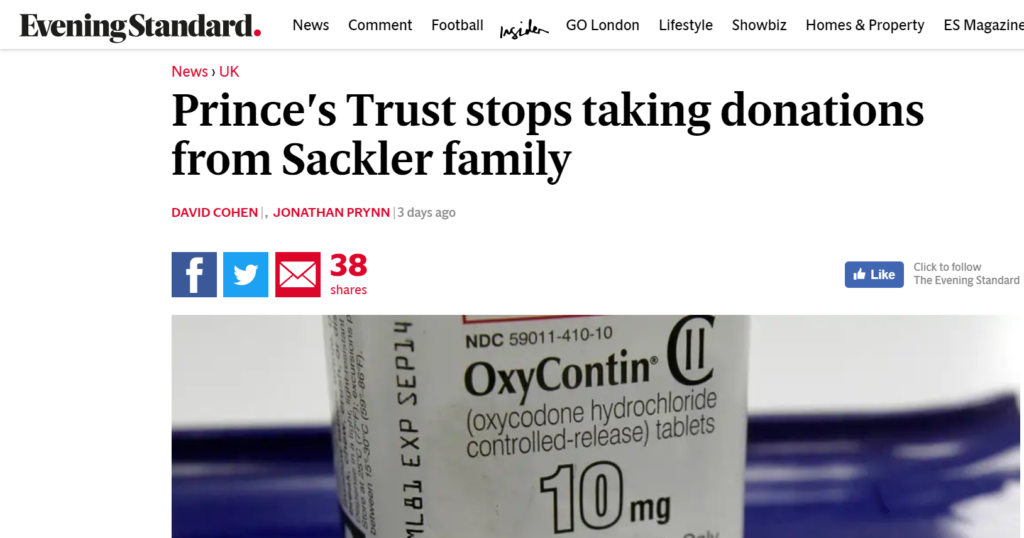Let’s start with recent content: the hubbub surrounding Oxycontin-tainted donations from the Sackler Foundation “does not threaten but actually safeguards the commonplace acceptance of funding from tainted sources.” That makes funding an ethical issue.
Accepting a donation constitutes action; and in the Sackler case the action constitutes one half of a symbiotic relationship between public do-goodery and private do-not-so-goodery. That is to say, the ethical issue is a vexing one. As the New York Time’s art critic Roberta Smith points out (discussing the Sackler story), “this is the way museums survive and that rich people do, in fact, assuage their guilt by kind of giving back.” Or, as one expert explained donors give in order to “shift attention from business practices that may strike some as unsavory.”
Hardly breaking news. Yet a story, a situation, that the humanitarian sector too easily ignores. Are we really so willing to play the Marc Cohen of the foreign aid world? The Winston Wolfe? Hired by donors to ensure that our life-saving programs cleanse the bloody muck out of their expensive cars?
Q1. Humanitarians worry all the time about not getting coopted or instrumentalized by political actors in war zone, so why are we such quiet customers in a market where the purveyors of opioids or violence or inequality can purchase their exoneration?
Q2. Are we only cleaning up the muck, or enabling it? Considering everything else the Saudis are dropping on Yemen, their dropping of $1B of humanitarian aid over the past two years is not simply hypocrisy.
I know what you are thinking. Marc Cohen? The Wolf? That’s too harsh. Well, yes and no. We humanitarians do have good intentions on our side. Not so sure about Cohen or Wolf. Yet practice would suggest that we humanitarians regularly purchase our own forgiveness, that of both our donor public (relatively easy, but ??) and ourselves (much harder). We are agency and donor rolled into one, where our good works or intentions are used to justify our compromised choices and harmful consequences.
Look at the backlash against MP David Lammy’s bang-on criticism of Comic Relief’s celebrity ambassador Stacey Dooley use of the impoverished, pathetic-black-child-in-white-savior’s-arms trope. As Dooley herself answers, Comic Relief funding has “saved” kids’ lives, and that presumably shuts down Lammy as if his criticism were killing babies somewhere in the world. Judging by public comments, most agreed with Dooley and Comic Relief, failing to register Dooley’s contribution to the perpetuation of stereotypes (and media treatment of it) that undergird the very poverty of the child in her arms.
The sector cannot afford to ignore such avoidable cases of moral compromise, but on a more fundamental level, can it afford a more ethically strict fundraising code? Purity would come at a high cost. I think that most of us accept that the principles of humanitarian fundraising must exclude the worst offenses and embrace considerable compromise in order for our programs and for our salaries to exist. Regardless, this needs much more deliberation and visibility within agencies. Are we happy with our choices? Are we concerned that times are changing?
The ethical risk here is deceptive and increasingly costly. These funds pay for operations and corrode our moral authority, which often serves as a basis for action. (Let’s sidestep the question of whether humanitarians overestimate their own moral legitimacy.). Good enough for the goose must be good enough for the gander. If we are to raise our voice in frustration and pain at the deliberate destruction of human lives and human communities, then we must maintain a legitimacy that is grounded in standing on principle, lest the states and armed groups perpetrating these atrocities explain that they too must compromise in order to safeguard their vital interests. Can we really protest the rising realpolitik sacrifice of ideals at the altar of national self-interest and political expediency while turning a mostly blind eye to the sources of our funding? Perhaps not a moral equivalence, but nonetheless a moral parallel that increasingly runs the risk of being called out by the very progressives who have supported our cause.
There is another option, of course. As Marvel superheroes have done, perhaps we should acknowledge our own moral complexity and abdicate from our self-appointed role as global moral governor. In other words, the sector could put the denunciatory finger of J’accuse into its pockets, allowing populations in crisis to issue their own denunciatory accusations, organize their own protests and take power against their own violators. It could be open about its own difficult compromises. Note how this would reduce the reputational risk to the sector and at the same time protect humanitarian ideals by neither conceitedly nor paternalistically standing upon the pedestal of moral superiority.
